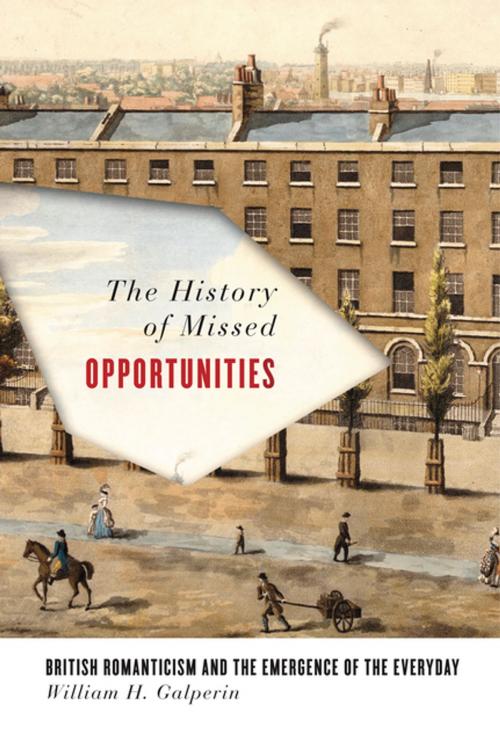The History of Missed Opportunities
British Romanticism and the Emergence of the Everyday
Fiction & Literature, Literary Theory & Criticism, British| Author: | William Galperin | ISBN: | 9781503603103 |
| Publisher: | Stanford University Press | Publication: | May 23, 2017 |
| Imprint: | Stanford University Press | Language: | English |
| Author: | William Galperin |
| ISBN: | 9781503603103 |
| Publisher: | Stanford University Press |
| Publication: | May 23, 2017 |
| Imprint: | Stanford University Press |
| Language: | English |
Through close engagement with the work of Wordsworth, Austen, and Byron, The History of Missed Opportunities posits that the everyday first emerged as a distinct category of experience, or first became thinkable, in the Romantic period. Conceived here as something overlooked and only noticed in retrospect, the everyday not only becomes subject matter for Romanticism, it also structures Romantic poetry, prose, and writing habits. Because the everyday is not noticed the first time around, it comes to be thought of as a missed opportunity, a possible world that was not experienced or taken advantage of and of whose history—or lack thereof—writers become acutely conscious.
Consciousness of the everyday also entails a new relationship to time, as the Romantics turn to the history of what might have been. In recounting Romanticism's interest in making things recurrently present, in recovering a past of what was close at hand yet underappreciated, William H. Galperin positions the Romantics as precursors to twentieth-century thinkers of the everyday, including Heidegger, Benjamin, Lefebvre, and Cavell. He attends to Romantic discourse that works at cross purposes with standard accounts of both Romanticism and Romantic subjectivity. Instead of individualizing or turning inward, the Romantics' own discourse depersonalizes or exhibits a confrontation with thing-ness and the material world.
Through close engagement with the work of Wordsworth, Austen, and Byron, The History of Missed Opportunities posits that the everyday first emerged as a distinct category of experience, or first became thinkable, in the Romantic period. Conceived here as something overlooked and only noticed in retrospect, the everyday not only becomes subject matter for Romanticism, it also structures Romantic poetry, prose, and writing habits. Because the everyday is not noticed the first time around, it comes to be thought of as a missed opportunity, a possible world that was not experienced or taken advantage of and of whose history—or lack thereof—writers become acutely conscious.
Consciousness of the everyday also entails a new relationship to time, as the Romantics turn to the history of what might have been. In recounting Romanticism's interest in making things recurrently present, in recovering a past of what was close at hand yet underappreciated, William H. Galperin positions the Romantics as precursors to twentieth-century thinkers of the everyday, including Heidegger, Benjamin, Lefebvre, and Cavell. He attends to Romantic discourse that works at cross purposes with standard accounts of both Romanticism and Romantic subjectivity. Instead of individualizing or turning inward, the Romantics' own discourse depersonalizes or exhibits a confrontation with thing-ness and the material world.















